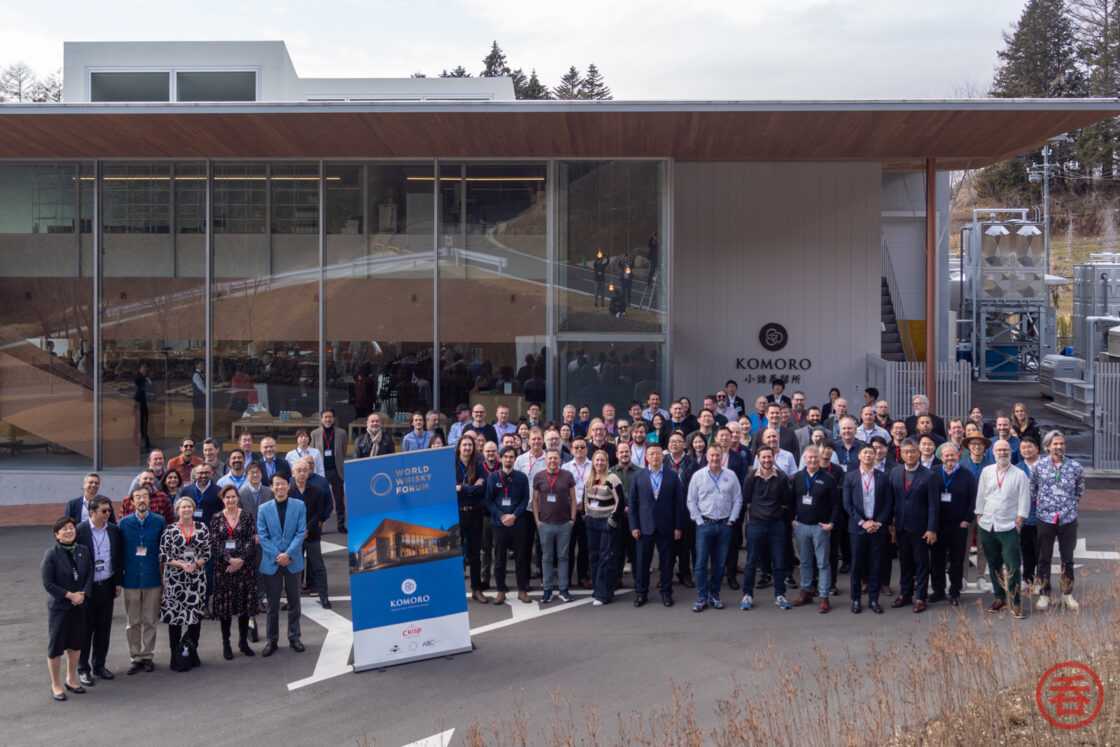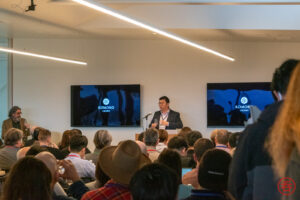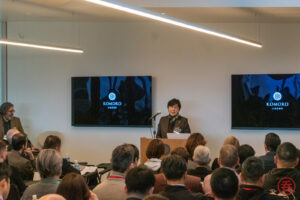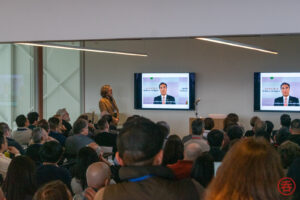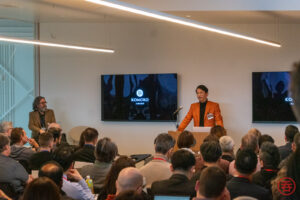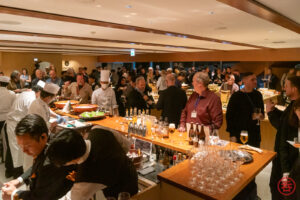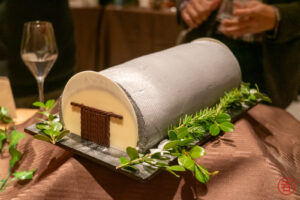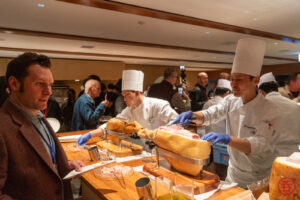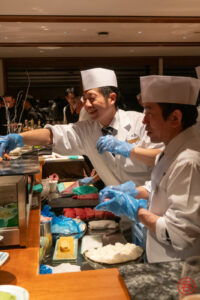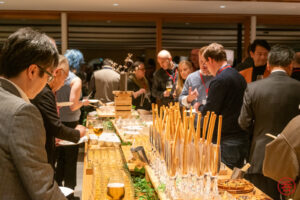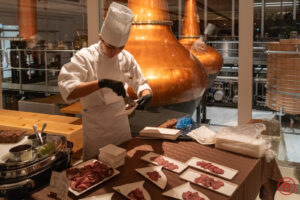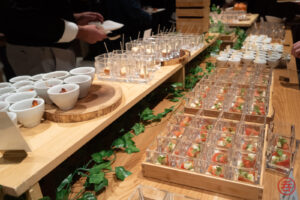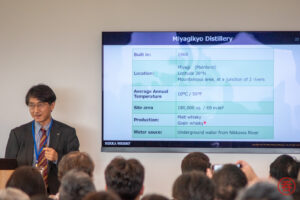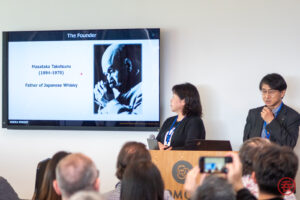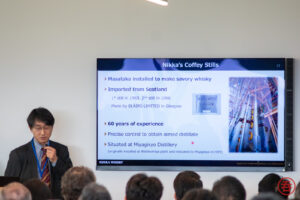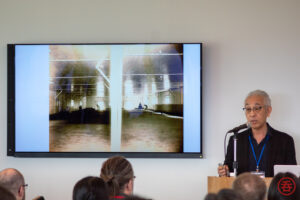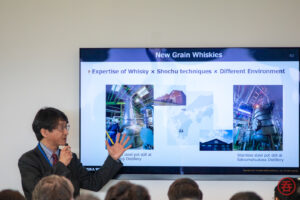The World Whisky Forum went to Asia and Japan for the first time this year, from February 19-21, 2024. Thanks to the extreme generosity of the hosts at the beautiful Komoro Distillery in Nagano, I had the privilege of attending the event as press.
What is World Whisky Forum?
It’s important to first highlight that World Whisky Forum isn’t a whisky festival, seminar, or brand event. If I had to describe the World Whisky Forum in a sentence, I’d call it “a multi-day private whisky retreat for industry folks.” The attendees represented almost the entirety of the whisky value chain: maltsters, still makers, distillers, distillery owners/managers, cask makers, glass makers, distributors, independent bottlers, retailers, consultants, drinks writers, and drinks media (me?).
Who’s missing? Whisky fans! As I suspected, while the event was not invite-only or whatever, the entry cost and language barrier–the latter in much of Japan’s case–meant that of the ~100 attendees, not a single person I met was not somehow involved with whisky on a professional basis.
The World Whisky Forum felt less about celebrating or pitching whisky as a drink and more about cultivating whisky as a business. For industry people, that can be a refreshing break from the standard whisky festival where you give the same spiel about your drinks hundreds of times in a day. Speakers aren’t swarmed for selfies after their talks are over. If you have a question, just ask them at the group dinner that night or during the coffee break the next morning. That kind of access is simply unparalleled.
For readers of this site, it will be nigh impossible to compress three days of whisky talks into one article, so I’ll do my best to hit the main points. If you would like more details about any particular discussion, please don’t hesitate to contact me directly.
World Whisky Forum 2024 – Day 1 / Session 1
Moving into the event itself, Day 1 kicked off with a tour of Komoro Distillery’s facilities. The last time I was up at Komoro was before the stills were installed and any casks were in the warehouses, so it’s great to see everything come together so quickly. Regardless of where you are within the distillery, floor-to-ceiling windows overlook the operation.
This was quickly followed by an intro from Dave Broom, the emcee for the three days, describing why everyone gathered and why they gathered in Asia. The theme of this year’s event was “Asia-Pacific: Whisky’s New Powerhouse,” so the speaker series was mostly about what’s going on in whisky in Asia-Pacific, with representation from distilleries both large and small in Japan, China, Korea, Australia, New Zealand, and India. There was even a video message from the governor of Nagano Prefecture, Shuichi Abe.
Komoro Distillery
The first speakers, appropriately, were from Komoro Distillery itself. Ian Chang described why he left Kavalan, and why he joined Komoro Distillery. He then took the audience through a tasting of Komoro Distillery’s new make and 4-month old new born (both at 46% abv), highlighting the great water quality sourced from the active volcano Mt. Asama, as well as the maturation environment afforded by Komoro.
As you might imagine, with a distiller like Ian, Komoro Distillery’s approach is both methodological and scientific, so they have quite a good idea of what to expect ten years later. Like Kavalan, the initial plan for the first several years is not to offer age-statement whiskies. Speaking on casks, he mentioned that Japan offers much more freedom regarding the types of wood that can be used (thanks, JSLMA).
Why Komoro? Of course, the very cold, high-quality water is of utmost importance for fermentation, but Ian also described how accessibility for tourism was a main factor in the decision — from Tokyo, the Shinkansen trip is just an hour.
Jim Swan House Dedication, Dinner
After a brief greeting from event sponsors Crispt Malt, WV Great Barrel Company, branding agency Contagious, and ASC Barrels, the group moved down to the first floor, where we heard some brief welcomes from the mayors of Komoro City and Karuizawa City. But perhaps of greater importance was the dedication of Komoro Distillery’s warehouses to the late Dr. Jim Swan—going forward, they will collectively be known as the “Jim Swan House.” Dr. Jim Swan’s two daughters also brought a personal note to the dedication.


Dinner was, in a word, nice. I’ll let the pictures do the talking here…
Day 2 – Session 2 “Founding Philosophies” & Session 3 “The Japanese Experience”
Founding Philosophies
These sessions focused on the how and why of building a whisky distillery from scratch. The lineup:
- Jane Overeem of Overeem Distillery (Tasmanian Single Malt)
- Taiko Nakamura of Gaiaflow (Shizuoka Distillery, Japan)
- Matthew Johns of Pōkeno Whisky Company (New Zealand)
- Bryan Do of Three Societies Distillery (Ki-One, Korea’s first single malt whisky)
Dave highlighted the variety here: a person starting a new distillery in an established whisky country (Japan), a pioneer in a whisky-producing country (Australia), a person at the forefront of establishing a new country (New Zealand), and the first person to establish a distillery in his country (Korea).
In the interest of word-count, let’s focus on Japanese whisky for the remainder of this article.
This brings us to Taiko Nakamura’s discussion of Shizuoka Distillery. He opened with his whisky journey, beginning back in 2003 at Yoichi. That led to visiting Scotland, Kavalan in Taiwan, and then the birth of his whisky-importing company. He also revealed that his grandfather was a commander in the Imperial Japanese Navy. We’ve covered Shizuoka extensively in the past, so I’ll point you to one of those articles, but the cliff notes are about using Japanese barley from the get-go (despite being 2-3x the cost of imported malt), using local cedar washbacks, a direct wood-fire still, and of course the ex-Karuizawa pot still. Most importantly, Shizuoka Distillery was developed so that Nakamura-san could share whisky he personally wants to drink with the world.
One of the pointed questions from MC Dave Broom: would you do it again if you could go back? “I don’t recommend [it].” Well Nakamura-san, we’re glad you don’t own a time machine. He partially credits the timing of the start of his distillery with its success: it was right after the domestic success of NHK’s “Massan” drama.







The Japanese Experience
Four powerhouses of Japanese whisky were on hand to speak: Suntory, Nikka, Kirin, and Venture Whisky. Dave Broom said he wanted to talk about Japanese whisky specifically because the category is comparatively old in the region. While new distilleries used to look to Scotland for techniques and styles, more and more are turning to Japan for inspiration. And the lessons learned since Japanese whisky started over a century ago.
Shinji Fukuyo, fifth-generation chief blender for Suntory, started us off chronologically. The initial years for Suntory were tough: they didn’t have a successful whisky until 13 years after distillation started. I’ll point you to this article for more history of the category’s 20th century. Things finally started turning around for Suntory with the highball boom in 2008.
One of the things that Fukuyo-san highlighted was that the popular narrative for the success of the whisky highball is “marketing,” which I have pushed here. But he instead attributes it to the constant improvement of the quality of the whisky itself.
Ultimately, he says what makes Japanese whisky particularly good is the harmony of Japan’s nature–particularly the water and climate–with craftsmanship. (that narrative counts as “marketing” if you ask me)
Good is one thing, but what about unique? He says it’s because Japanese whisky companies don’t have a culture of exchanging stocks for blending. Instead, they’ve had to make a wide variety of whiskies internally.
From Nikka, Emiko Kaji, Global (Ex-Japan) Marketing/Sales Manager and Hiromi Ozaki, Chief Blender. Nikka celebrates its 90th anniversary this year. Their session focused primarily on the background of company founder Masataka Taketsuru. It’s a background you can read in extensive detail in this translation of his serialized autobiography.
Jota Tanaka from Kirin brings us to Fuji Gotemba Distillery (in English, “Mt. Fuji Distillery”). The distillery is located there because Mt. Fuji offers abundant, high-quality water. One of the more interesting things that Tanaka-san mentioned was that the company has only fairly recently gotten more serious about making whisky for outside of Japan — their relatively new Fuji line evidences that. “We never thought about the global market,” he said. You could also point to the extensive investment they’ve been making into expanding capacity.
To wrap up “The Japanese Experience,” Venture Whisky’s Ichiro Akuto took us through the background of establishing the Chichibu Distillery. That’s also something we’ve addressed here in the past, but the gist is that while he famously rescued plenty of Japanese whisky from certain doom, he felt an obligation to make more whisky for future generations. To do so, he went to Karuizawa Distillery and made whisky there. Despite officially closing in 2000, “2006 is the real last vintage of Karuizawa,” by the way.



Day 2 closed out with an extensive dinner and a potluck-style tasting session. Not only the speakers, but other participants brought bottles for everyone to try and learn more about.
Day 3 – Session 4 “Issues Facing Exporters” & Session 5 “What can whisky be?”
These sessions were highly technical in nature, and unless you’re actively involved in the production of whisky or international sales, they would likely go over your head (as they did mine). Fukuyo-san, for example, spoke about how the shape of a pot still changes the mist transfer ratio, a term I’m not only unfamiliar with but also one that returns literally zero results on Google. Maybe one day!
Closing
Let’s answer the real question: should you attend the World Whisky Forum? The next one is scheduled for June 2025 at France’s Maison Lineti. If you work in the whisky industry or plan to in the future, absolutely. The Forum is unique because it is not a whisky festival but a whisky conference.
Thanks again to the team at Komoro Distillery for hosting an unforgettable three days in Nagano Prefecture!















Hi there! I created and run nomunication.jp. I’ve lived in Tokyo since 2008, and I am a certified Shochu Kikisake-shi/Shochu Sommelier (焼酎唎酒師), Cocktail Professor (カクテル検定1級), and I hold Whisky Kentei Levels 3 and JW (ウイスキー検定3級・JW級). I also sit on the Executive Committees for the Tokyo Whisky & Spirits Competition and Japanese Whisky Day. Click here for more details about me and this site. Kampai!

